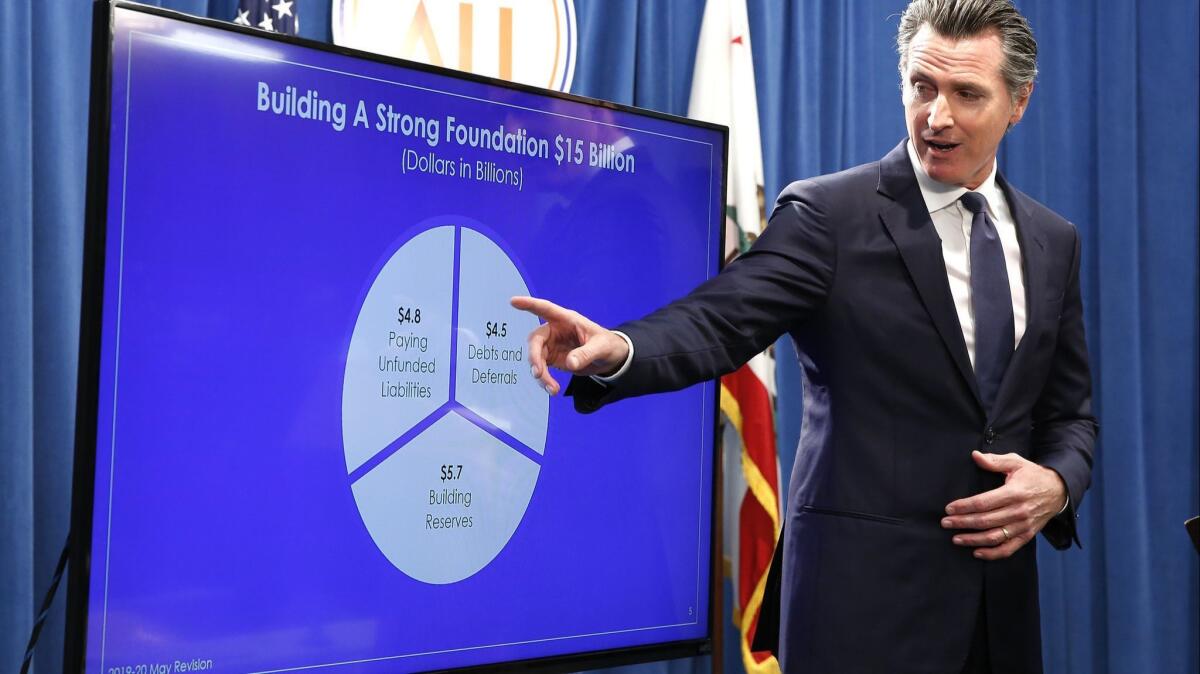States get tax windfall after struggling with forecasts

States are enjoying windfalls after struggling to predict how President Trump’s federal tax law changes would ripple through their revenue.
All 15 of the states that have reported April tax collections so far have seen them come in better than expected, according to a list compiled by National Assn. of State Budget Officers. California, Illinois and Connecticut are among them, and New Jersey is expected to report its tally next week. New Jersey Gov. Phil Murphy said this week that tax collections will be more than $250 million above projections.
“It gives decision-makers cushion,’’ said John Hicks, executive director of the Washington-based National Assn. of State Budget Officers. “Where states are debating or on the margins, this little extra revenue certainly makes this a little easier.’’
The influx is providing extra cash for governments already benefiting from the nearly decade-long economic expansion and is coming just as many set their budgets for the coming fiscal year. In some cases, it’s making up for shortfalls earlier in the budget year as tax revenue lagged behind official forecasts because of the difficulty in predicting how the U.S. tax changes, including the $10,000 cap on state and local deductions, would ripple down through the state capitals.
Gov. Newsom forecasts largest tax windfall in California history »
In California, for example, officials said that taxpayers procrastinated in filing their returns this year over concern that the new deduction limit would drive up what they owe. Then, in April, the state collected about $3 billion more in personal-income taxes than Gov. Gavin Newsom’s forecast, making up for a shortfall earlier this year and adding to the government’s swelling surplus fueled by stock market gains.
Moody’s Investors Service said California’s experience bodes well for other high-tax states, and Mikhail Foux, head of municipal strategy at Barclays Plc, said most are likely to see revenue surpass expectations in April. Connecticut’s personal-income taxes last month brought in $100 million more than forecast. While New York hasn’t reported April’s figures, its March tax receipts were higher than forecast.
Some are already laying out plans on how to use their extra cash.
After Illinois’s April tax collections topped forecasts by $1.5 billion, Gov. J.B. Pritzker backed off his proposal to put off some of next year’s pension payment, which critics had derided as a partial pension holiday. That was welcomed by investors, who bid up the price of the state’s bonds, pushing down the yield penalty it pays to the smallest since July because it will help with the government’s massive pension-fund debt.
New Jersey Gov. Murphy said May 6 that he’d put the $250 million of unexpected tax revenue toward homeowner relief from the nation’s highest property taxes if lawmakers approve his proposed millionaire’s tax for the fiscal year starting July 1. But the tax hike on the highest earners faces a challenge in the legislature, where the Senate leader opposes it.
Even so, the extra revenue is a welcome development for Murphy, who promised a more conservative approach to forecasting than the prior administration that was handed a slew of bond-rating downgrades.
Murphy’s job was complicated by the difficulty of determining how the federal changes would affect Garden State residents. From July to January, New Jersey income-tax revenue was down 6%, while growth had been forecast at 5.4%. In February, S&P Global Ratings warned that even an April bump — on which the state is still counting — might not be enough to fill the hole.
It still remains to be seen how much of the higher-than-expected revenue across states will be recurring or if it’s a one-time bounty, according to the National Assn. of State Budget Officers.
“We’re seeing good signals and good signs in the economy at large, that always would tend to be correlated with revenue growth,” said Matt Butler, a vice president and senior analyst at Moody’s. “Clearly growing revenue, all else equal, tends to be credit positive for the states.’’
More to Read
Inside the business of entertainment
The Wide Shot brings you news, analysis and insights on everything from streaming wars to production — and what it all means for the future.
You may occasionally receive promotional content from the Los Angeles Times.










